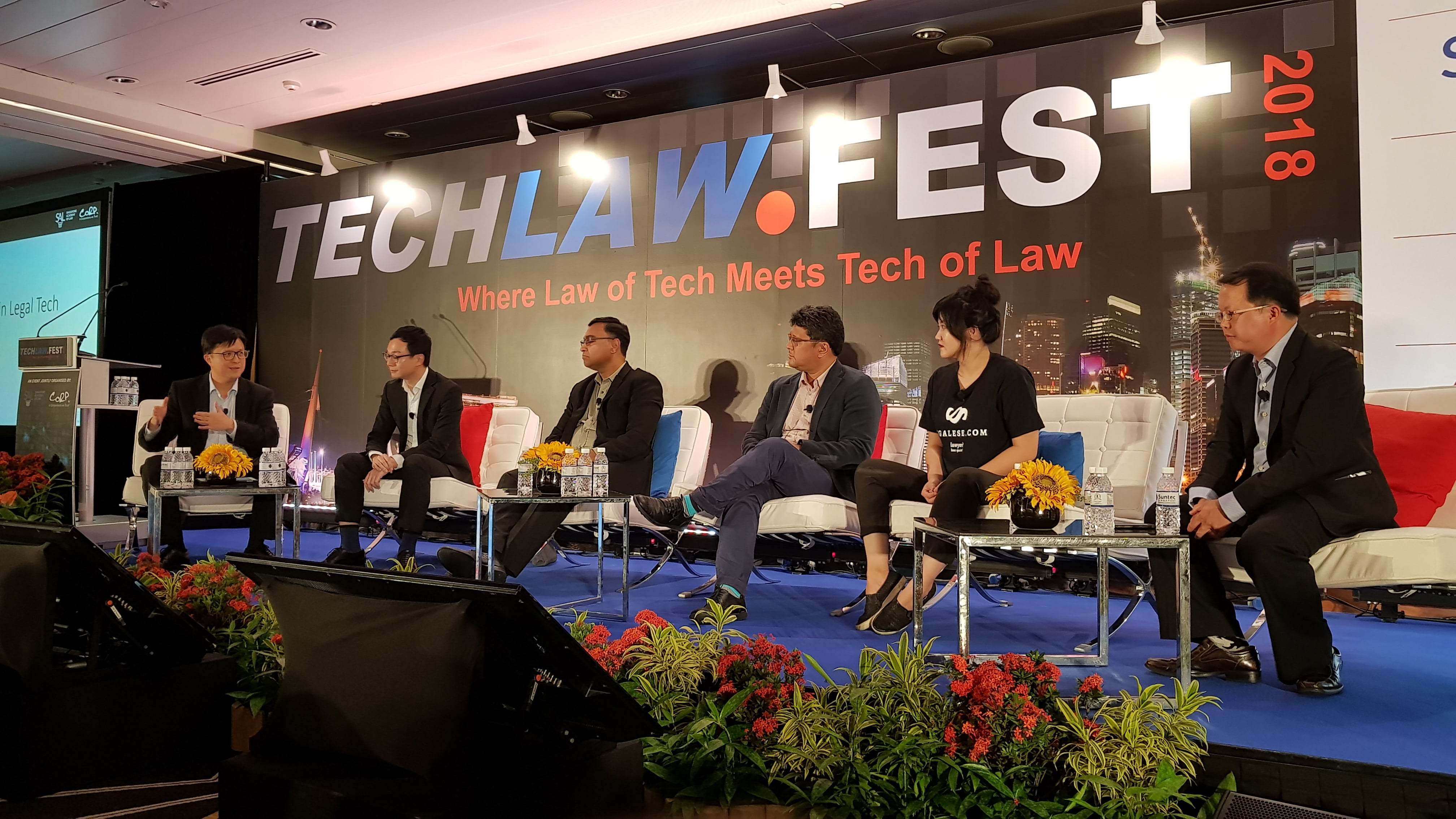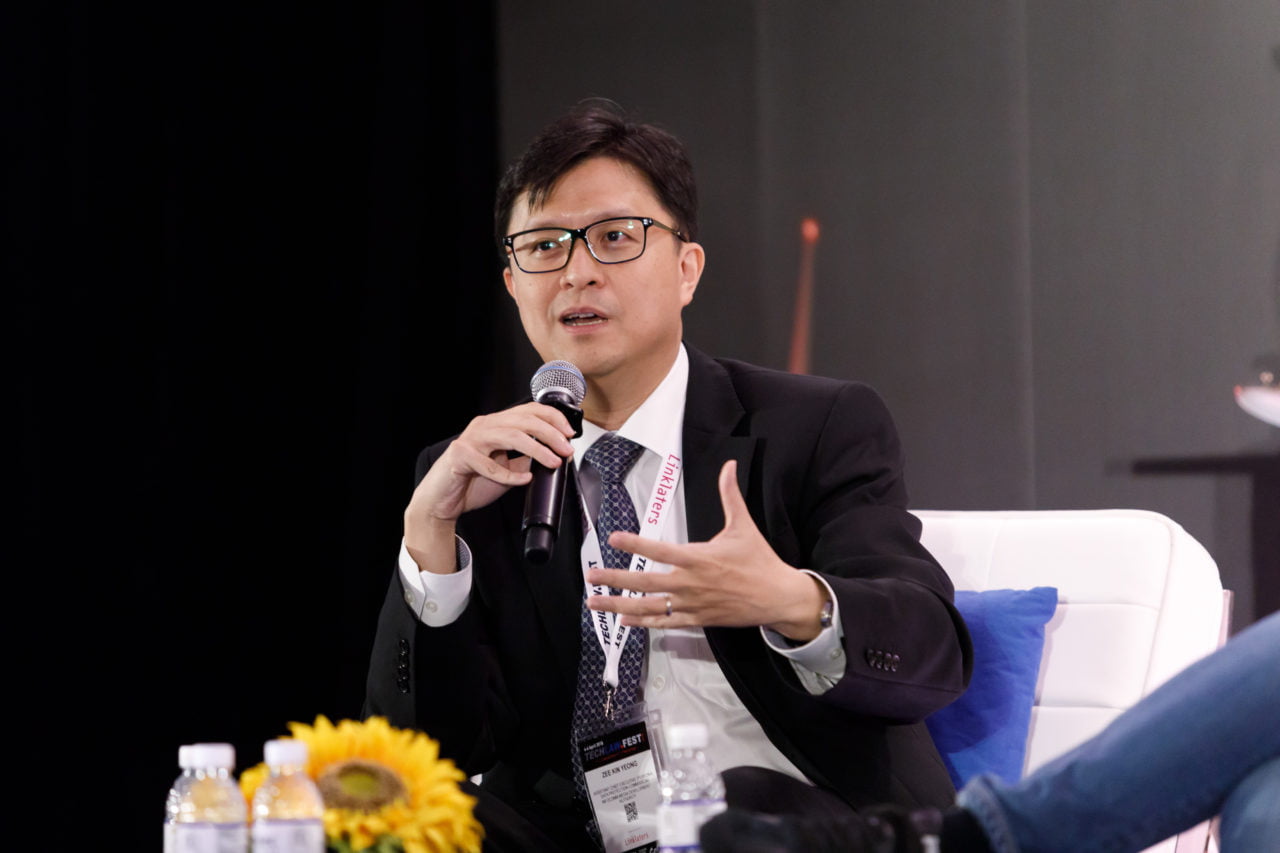Interview by Josh Lee | Edited by Amelia Chew
LawTech.Asia had the privilege of being a media partner for TechLaw.Fest 2018. The inaugural TechLaw.Fest held from 4 to 6 April 2018 saw the convergence of legal professionals, technologists, entrepreneurs and policy makers, conversant and passionate about Technology Law and Legal Technology, coming together to discuss the future of Singapore’s technology scene. During TechLaw.Fest, the LawTech.Asia team met with various speakers, exhibitors and attendees to learn more about the work that they do and their experience at the conference.
LawTech.Asia sat down for a chat with Yeong Zee Kin, Assistant Chief Executive of the Infocomm Media Development Authority (IMDA) and Deputy Commissioner of the Personal Data Protection Commission (PDPC). Zee Kin was a panelist on the Smart Regulation for a Smart Nation panel and the chairperson of the Legal Issues in Legal Tech panel.
Having participated in two panels over the course of TechLaw.Fest 2018, what were some of your key takeaways from the two panels that you were in?
Both panels revolved around the same theme but we approached it from different directions. The first panel (“Smart Regulation for a Smart Nation”) approached it from the perspective of the regulator and examined what kind of regulations are required. This panel focused more on potential regulatory models and discussed different perspectives of how regulatory sandboxes are used. The FinTech Regulatory Sandbox by the Monetary Authority of Singapore (MAS) is one such regime that allows for the ability to control license terms. There are some guidelines that we can potentially look to, such as the materiality test for determining when the risk becomes material and regulation should kick in.
From the perspective of the PDPC, I shared a slightly different model. It is not a regulatory licensing regime but rather a law that we enforce. We have the ability to issue advisory guidelines. We used our power of exemption to craft a regulatory sandbox with a different purpose – that of testing new policies we intend to enact and co-creating the details of the Personal Data Protection Act (PDPA). This forms part of a continuum of measures that we adopt, which includes clarifying principles through advisory policies to guides that deal with processes and technology. These are tools that we can use to set the right regulatory tone.

(L-R) Moderator of the panel “Legal Issues in Legal Tech” Yeong Zee Kin (Assistant Chief Executive, Infocomm Media Development Authority and Deputy Commissioner, Personal Data Protection Commission) along with panellists Edmund Koh (Chief of Staff & General Counsel, INTELLLEX), Rajesh Sreenivasan (Partner, Head of Technology Media and Telecoms Practice, Rajah & Tann Singapore LLP), Adrian Kwong (Managing Director, Consigclear LLC), Alexis Chun (Co-founder, Legalese) and Kwong Weng Wan (Head, Group Corporate Services & Group General Counsel, MapleTree Investments Pte Ltd) (Image credit: Singapore Academy of Law)
The second panel (“Legal Issues in Legal Tech”) zoomed in on the legal profession and explored the same theme from a different perspective. Ultimately, the conclusion drawn was that you need to have different regulatory models for different stakeholders such as law firms and in-house lawyers. The panel also considered whether it would be necessary to include legal tech companies as part of the larger legal sector and whether they need a different set of regulations because their approach is different, in that legal tech companies provide a product that is sometimes coupled with legal advice. In such cases, it is important to ensure that customers know what the product is (or is not), and whether the service provided constitutes the provision of advice or information. This does not fit into the existing models of regulation for in-house lawyers. Nevertheless, we may need a similar form of legislation to provide assurance for members of the public.
With our heightened dependence on technology, someone needs to start looking at some of the existing risks. We would need to consider efficiency gains, risk management, and concerns from an insurance and liability point of view.
Being a legal professional yourself, how far do you feel has legal technology come in Singapore (whether in practice or outside of it), and what effect has Singapore’s journey in legal technology had on Singapore’s legal professionals?
Legal tech is not something new. If you look back in history, it started with the national computerisation programmes in the 1980s. While previously it was focused on computerisation of public agencies and making interactions with public agencies computerised as well, there has been a distinct pivot since then. With the development of technology, clients have become more demanding in terms of the type of technologies that lawyers use. The current push for the adoption of legal tech focuses on getting law firms and legal departments to rely on technology. The drive for change has to be internalised, and not dependent on external push or pull factors.
At the same time, law firms are driven not just by client demands but also out of their own need for greater efficiency. There is a lot more happening these couple of years following the publication of the Legal Technology Vision between lawyers, engineers and business owners, and a lot more tools are emerging.
Speaking on the final day of TechLaw.Fest 2018, would you like to share some of your closing thoughts about the event?
This is the third time we are running such a conference. The first two were somewhat more traditional as law conferences go, but it’s different this time. In the past, there was no exhibition space as we would not have been able to find this number of legal tech solution vendors to exhibit. I recall that during our first conference in 2011, all we had in the exhibition hall were law publishers selling books. This year, we had an interesting collection of exhibitors. It’s also the first time that we have had a hackathon segment. It’s a combination of these three things – the conference, the exhibition and the hackathon – happening within walking distance of each other that really created the buzz.
We have managed to build good momentum in the legal tech scene over the last couple of years. I’m excited to see where we will go next.
–
This piece of content was jointly produced by LawTech.Asia and the Singapore Academy of Law.
